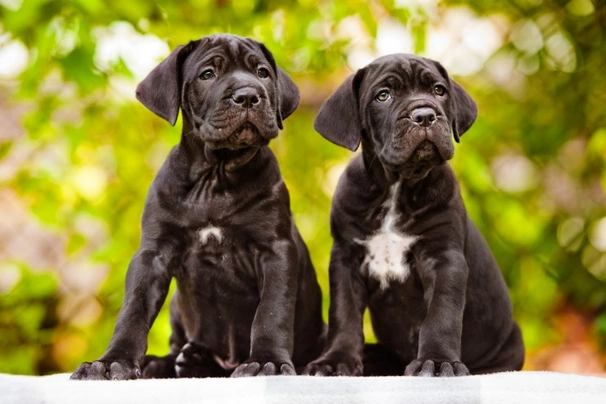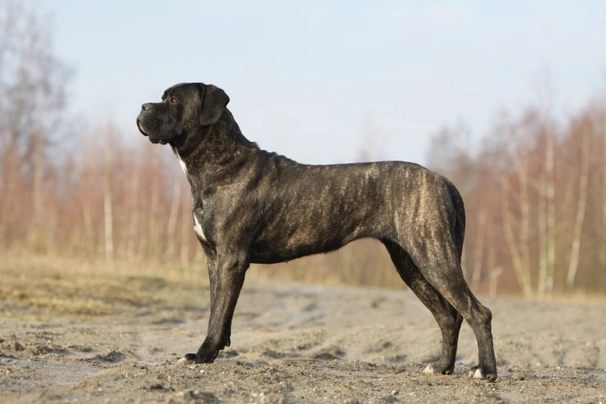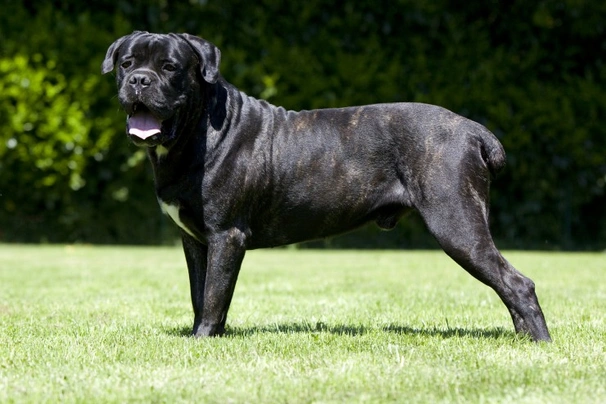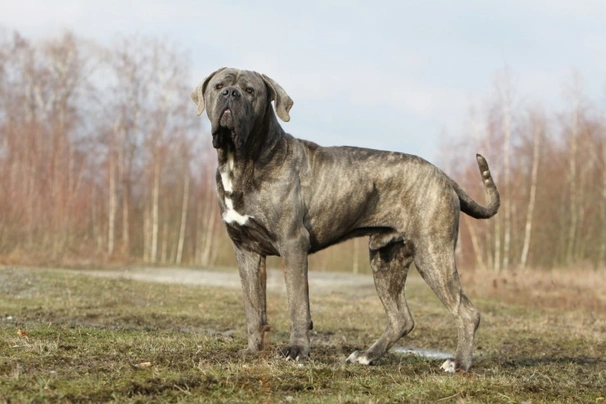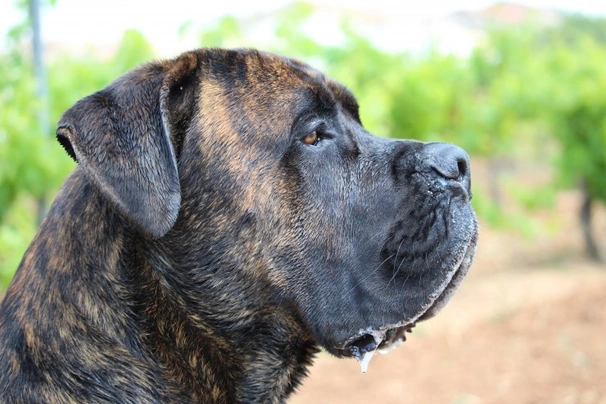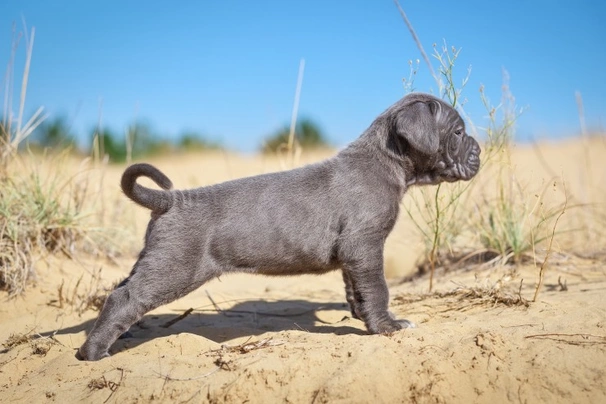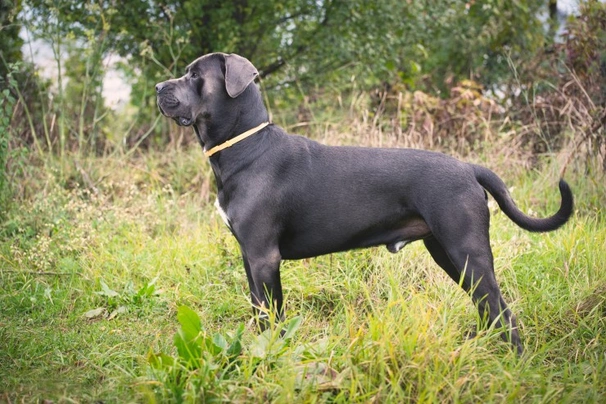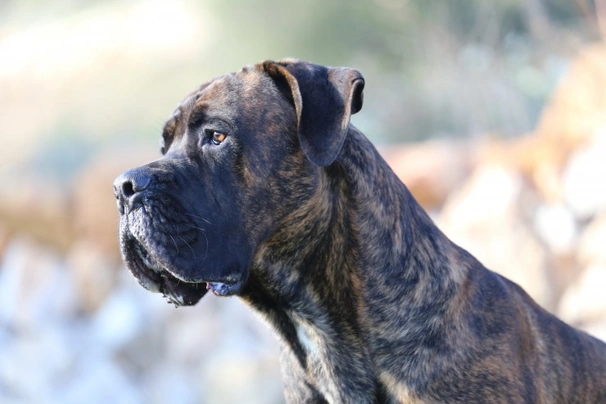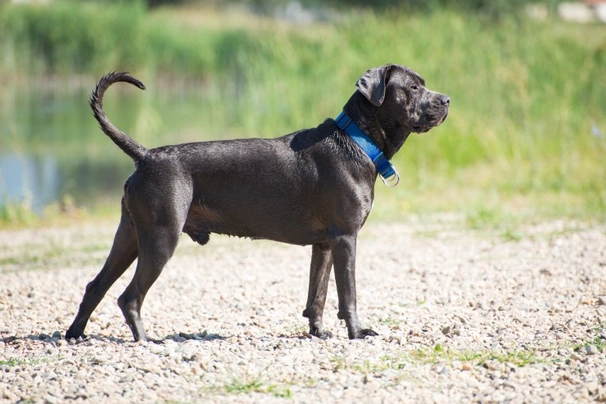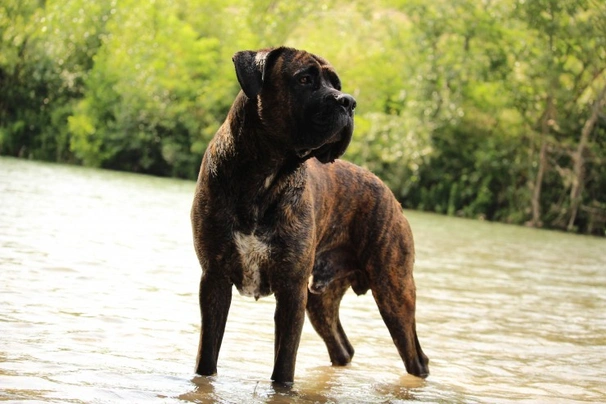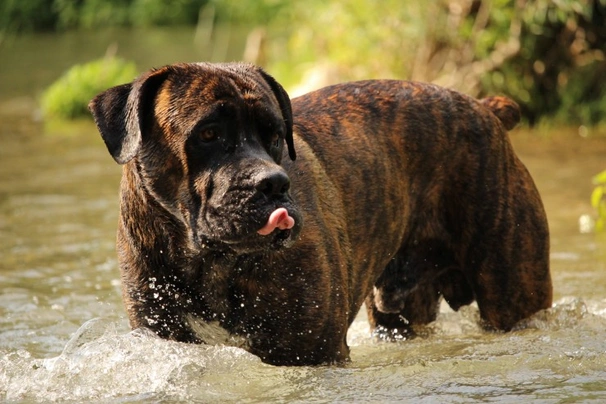Cane Corso
Pros
Cons
Introduction of the Cane Corso
The Cane Corso is a striking mastiff-type dog, renowned for its strength, loyalty, and protective instincts. Originating from Italy, this breed was historically utilised for guarding, hunting, and as a steadfast companion. In modern times, the Cane Corso continues to captivate dog enthusiasts with its commanding presence and affectionate nature within family environments. Due to a relatively low profile in the UK, it remains less common compared to its popularity in Italy and the US, yet interest is growing thanks to its unique qualities and versatility.
Physically, the Cane Corso is a muscular, athletic dog with a brachycephalic head and broad chest, offering both power and grace. Temperamentally, it combines a calm confidence with a protective streak, excelling as a family guardian without unnecessary aggression. However, this breed demands an experienced owner who can provide consistent training and ample exercise to channel its natural instincts positively.
Ideal owners enjoy an active lifestyle, preferably in a home with a large, secure garden, allowing the Cane Corso space to roam and exercise freely. Their devoted nature means they thrive on close human companionship and do not handle extended periods of solitude well, making them best suited to households with one or more people usually present.
Caring for a Cane Corso involves regular but moderate grooming, consistent training, and health vigilance due to predispositions common to large breeds. Prospective owners should be prepared for notable exercise needs and the responsibilities that come with managing a powerful working dog.
Perfect For
Experienced owners or families who live in spacious homes with secure gardens, active individuals who enjoy outdoor activities, and those looking for a protective yet affectionate companion.
Key Considerations
The Cane Corso's brachycephalic features require monitoring for breathing issues, its strong protective instincts necessitate early socialisation and training, and the breed is prone to separation anxiety if left alone for long periods. Additionally, this breed has moderate shedding and grooming needs and can be vocal when alerting to visitors.
History of the Cane Corso
The Cane Corso traces its lineage back to ancient Roman Molossian dogs known as canis Pugnaces, renowned for their strength, courage, and loyalty. As a lighter, more agile mastiff-type than the Neapolitan Mastiff, it was prized for hunting, guarding property, and working alongside humans throughout Italy. Early records date the breed to as far back as 1137 AD, where the name "Cane Corso" referred to a robust, service-oriented dog often called Dogo di Puglia.
Early Development
The breed originated from crosses between native Italian mastiffs and dogs brought from Britain called pugnaces Britanniae by Roman legions. This introduced traits such as an undershot jaw and stamina. Over centuries, the Cane Corso evolved into a balanced working dog, valued on farms for hunting wild boar and guarding livestock. However, by the 1970s, population numbers had dwindled drastically, restricting the breed mainly to southern Italy. Efforts to save and revive the Cane Corso were led by enthusiasts Sig Bonnetti and Stefano Gandolfi in the 1980s, who established a breeding centre in Mantova and produced foundational litters from the black dog Dauno and female Tipsi, cementing the modern type.
Modern Recognition
The Society Amatori Cane Corso formed in 1983, promoting breed standards that led to official recognition by the Italian Kennel Club (ENCI) and the Fédération Cynologique Internationale (FCI) in 1996. The breed gained United Kennel Club recognition in 2008, though it is yet to be formally recognised by The Kennel Club in the UK as of 2025. Today, the Cane Corso enjoys popularity worldwide, particularly in the US and increasingly in the UK, celebrated for its impressive appearance, intelligence, and loyalty.
Appearance of the Cane Corso
Size and Build
The Cane Corso is a large, muscular dog standing 62-70 cm tall at the withers for males and 58-66 cm for females. Males weigh between 40-45 kg, with females slightly lighter but similar in weight. Their body is longer than tall with a well-muscled frame, strong neck, broad chest reaching the elbows, and a powerful, compact build. They have firm backs, strong loins, and long sloping croups with cat-like feet that are compact in front and slightly less so at the rear.
Coat and Colours
Cane Corsos have short, dense, glossy coats with a slight undercoat, offering protection without excessive maintenance. Their coat colours include black, plumb-grey, slate, light grey, light fawn, deer fawn, dark fawn, and "tubby" — brindle stripes on shades of fawn and grey. Fawn and tubby dogs also typically feature black or grey masks that do not extend above the eye line. Small white markings may appear on chest, toes, chin, or throat, but these are limited and breed-specific.
Distinctive Features
The skull is broad and slightly brachycephalic, flattening just behind the forehead. The muzzle is short, deep and powerful with a slightly undershot jaw and strong lower jaw covered by pendulous upper lips. Their large black nose has open nostrils. Eyes are medium, oval, set forward, giving an alert, intelligent expression. Ears are medium-sized, triangular, drooping and set wide apart. The tail is set high, thick at the root, carried upright but not curled. Their gait is an easy flowing amble with long strides and powerful movement.
Gender Differences
Males tend to be larger and more robust, with slightly longer necks and broader chests, while females show a more refined yet still powerful appearance. Temperamentally, males can sometimes present a stronger dominance, requiring consistent leadership, whereas females are often more nurturing yet equally vigilant.
Temperament of the Cane Corso
The Cane Corso is a loyal and dependable companion forming strong bonds with their family. They are naturally protective, making them excellent watchdogs, though generally reserved and wary of strangers without unwarranted aggression. Their loyalty extends deeply toward one special person in the household, though they remain affectionate and devoted to all family members. It is important to note their maturity is slow, often not fully developed until around 4 years of age.
Core Personality Traits
Cane Corsos possess a calm, confident temperament combined with a strong protective instinct. They are gentle and affectionate within the home yet vigilant and alert. The breed's high pain threshold means injuries and discomfort are not always obvious to owners, demanding careful observation.
Social Behavior
Socialisation from an early age is critical to manage their protective nature positively. They tolerate other dogs and household pets well if introduced properly and supervised, though their territorial instincts may cause confrontation in some cases. Despite being hunters historically, they do not exhibit high prey drive but should be monitored around small animals.
Working Instincts
As a traditional guardian and hunting dog, the Cane Corso displays strong working instincts with alertness and drive. They are happiest with regular mental and physical activity, including dedicated training and tasks that engage their intelligence.
Common Behavioral Challenges
Without consistent leadership, adequate exercise, and socialisation, Cane Corsos can become dominant and difficult to manage. Separation anxiety is a notable challenge; these dogs do not cope well with long periods alone, leading to destructive behaviours. Early, gradual training to tolerate being left alone is essential to prevent stress-related issues.
Intelligence / Trainability of the Cane Corso
The Cane Corso ranks as a highly trainable breed known for intelligence and eagerness to please. Success in training relies heavily on firm, consistent leadership and early introduction to boundaries. These strong dogs need to understand their role in the family pack to prevent dominance issues. Training must start early and be maintained throughout their lives to ensure they mature into obedient, balanced adults.
Puppy Training Priorities
Begin training from as early as 8 weeks old, focusing on socialisation with people, places, and other animals. Early introduction to basic commands like come, sit, stay, quiet, leave it, down, and bed sets the foundation for positive behaviour. Teaching limits and ground rules is critical given their strength and intelligence.
Training Methods That Work
Positive reinforcement techniques, including treats, praise, and play, are highly effective with Cane Corsos. Short, engaging training sessions maintain their interest and prevent frustration. Consistent commands and body language enhance communication, while incorporating non-verbal cues supports understanding.
Advanced Training Potential
Cane Corsos excel in protection work, obedience trials, and agility tasks suited to large working breeds. They respond well to challenges that stimulate both mind and body. Leash and recall training are essential, particularly due to their protective and territorial instincts.
Common Training Mistakes
Inconsistent leadership or neglecting early socialisation can lead to dominance, stubbornness, and behavioural problems. Overly harsh or punitive methods are counterproductive and can erode trust. Failing to address separation anxiety early may result in destructive conduct and stress.
Children and other
The Cane Corso can be a wonderful family companion when introduced and socialised appropriately from a young age. Corsos raised with children often form lasting bonds and enjoy interactive play. However, due to their size and strength, close supervision is imperative during interactions with toddlers and young children to ensure safe, calm play and prevent accidental injury.
Age-Specific Interactions
Toddlers should never be left alone with this breed, as even playful behaviour can be overwhelming. Older children and teenagers can benefit from teaching them how to safely approach and handle the dog, respecting its boundaries and signals. Training children on appropriate behaviour fosters mutual respect and safety.
Teaching Children Proper Interaction
Children should be taught not to disturb the Cane Corso when resting, to avoid rough handling, and to ask permission before engaging with the dog. Positive reinforcement helps children learn to engage respectfully, promoting a harmonious household environment.
Breed-Specific Considerations
Owners must remember the dog's protective instincts, especially around visitors and new children. Corsos can be somewhat territorial and may show wariness toward strangers, making early socialisation critical to mitigate over-protectiveness. Their patient but serious demeanor means they require mature child handlers.
Creating Safe Environments
Supervision remains key to preventing any potentially hazardous situations, and providing safe spaces where the dog can retreat undisturbed benefits all family members. Establishing boundaries between the dog and children avoids stress and supports positive relationships.
Health of the Cane Corso
The average Cane Corso lifespan ranges between 10 and 11 years, contingent on proper healthcare and diet. Several hereditary health issues warrant attention for prospective owners and breeders. Common conditions include hip and elbow dysplasia, cardiac issues such as dilated cardiomyopathy, and eye disorders like cherry eye, ectropion, and entropion.
Breed-Specific Health Conditions
Hip dysplasia affects over 37% of tested Cane Corsos, leading to pain and mobility concerns. Elbow dysplasia is also prevalent, reported in around 21% of the breed. Dilated cardiomyopathy poses significant risk due to sudden heart failure potential. Brachycephalic features may contribute to respiratory challenges, including brachycephalic obstructive airway syndrome (BOAS).
Genetic Testing Requirements
Responsible breeders perform hip scoring and elbow testing on all breeding stock to reduce inherited conditions. Detailed eye examinations and cardiac screenings are also recommended. These tests inform breeding decisions aimed at improving breed health.
Preventive Healthcare Schedule
Puppies require an initial vaccination course starting between 8-12 weeks followed by boosters as advised by UK vets. Regular dental care, parasite control, and weight management are crucial to long-term wellbeing. Owners should be vigilant for early signs of bloat, a life-threatening gastric condition common in deep-chested breeds.
Insurance Considerations
Due to breed-specific risks, insurance premiums tend to be higher than average. Selecting comprehensive policies covering hereditary conditions and emergency care is advisable. Maintaining a healthy lifestyle will aid in minimising medical expenses over the dog's lifetime.
Caring for the Cane Corso
The Cane Corso requires a dedicated care routine encompassing grooming, exercise, nutrition, and health monitoring to maintain optimal condition. Their short dense coats need regular brushing to minimise shedding and skin issues. Regular ear cleaning helps prevent infections common in floppy-eared breeds.
Daily Care Routine
A typical day includes morning and evening walks, playtime, and mental stimulation through training or puzzle toys. Puppies need shorter exercise periods appropriate to their growing joints, avoiding high-impact activities until fully mature at 18 months.
Living Environment Needs
This breed thrives in homes with secure, spacious gardens that provide room for exercise and exploration. Urban apartment living is unsuitable due to their size and exercise demands. Proper secure fencing is essential to prevent escapes and ensure safety, as Corsos are strong and intelligent escape artists.
Seasonal Care Adjustments
In summer, care must be taken to avoid heat exhaustion due to their brachycephalic nature; provide shade and plenty of water. Winter requires monitoring for arthritis symptoms and supplying warm bedding. Regular coat brushing is adjusted seasonally to manage shedding cycles in spring and autumn.
Senior Care Adaptations
Aging Corsos benefit from tailored diets with moderate protein and fat, joint supplements, and less strenuous but regular exercise to maintain muscle tone. Arthritis management and cognitive support may be needed. Comfortable, supportive bedding and safe access to living areas enhance quality of life.
Grooming of the Cane Corso
The Cane Corso's short, dense, and glossy coat is relatively low maintenance but requires consistent grooming to maintain health and appearance. A weekly brushing suffices for most of the year, with increased frequency during spring and autumn shedding seasons. Twice-weekly wipe-downs with a chamois leather can enhance coat shine without over-brushing.
Coat Maintenance Schedule
Daily grooming is not necessary, but regular inspection for skin irritation and parasites is important due to the breed's susceptibility to skin conditions.
Professional Grooming Requirements
Professional grooming is generally minimal, focusing on ear cleaning, nail trimming, and dental hygiene rather than coat trims, as the breed's coat does not demand complex styling or trimming. Most owners can manage grooming at home.
Home Grooming Techniques
Use a slicker brush or soft-bristle brush to remove loose hair and promote healthy skin. Regular ear checks help prevent infections, and gentle ear cleaning with appropriate solutions maintains ear health. Nail clippers or grinders should be used regularly to control nail length. Teeth brushing with dog-specific products supports dental wellbeing.
Common Grooming Challenges
Occasional skin flare-ups due to allergies require prompt vet attention to prevent chronic issues. Shedding can be managed with seasonal grooming routines, but owners should prepare for moderate hair around the home, especially during shedding peaks.
Exercise of the Cane Corso
The Cane Corso is a highly athletic and active breed that requires consistent daily exercise to maintain physical health and mental stimulation. Daily exercise sessions of 60 to 80 minutes best meet their needs, combining walks, play, and structured activities. Puppies should have carefully moderated exercise due to developing joints.
Daily Exercise Requirements
For adults, a short morning walk and a longer afternoon walk or run suit their stamina and energy levels. Allowing free play in a secure garden benefits the breed greatly but security to prevent escape is vital. For puppies, exercise should be limited to low-impact play and short walks to avoid joint stress until around 18 months.
Suitable Activities
Cane Corsos excel in activities involving obedience, protection training, and tracking. They also enjoy interactive games that challenge their intelligence and drive. Activities such as accompanying owners on bike rides and controlled swimming are beneficial for both fitness and bonding.
Exercise Restrictions
Puppies must be protected from jumping from heights, stair climbing, and excessive running. Adult dogs with brachycephalic features need monitoring in hot weather to prevent respiratory distress.
Mental Stimulation Ideas
Puzzle toys, obedience drills, and scent work enrich this intelligent breed’s daily routine and help stave off boredom-related destructive behaviours. A weekly exercise plan should balance physical and mental challenges.
Feeding of the Cane Corso
Feeding a Cane Corso requires attention to their growth stages and activity levels to maintain optimal health. Puppies require highly digestible, protein-rich diets divided into multiple small meals, gradually transitioning to adult food around 18 months. Adults should have high-quality, balanced diets split into two meals daily to mitigate bloat risk.
Nutritional Requirements
Diet should contain adequate protein (approx. 22-28%), moderate fats (12-18%), and limited fillers. Special attention to calcium and phosphorus levels supports bone health during growth. Avoid sudden diet changes to prevent digestive upset.
Feeding Schedule Guidelines
Puppies benefit from 3-4 small meals per day, while adult dogs thrive on two larger meals spaced to reduce gastric torsion risk. Treats are best limited and used for training purposes only.
Special Dietary Considerations
The breed is prone to allergies and bloat, so diets should avoid common allergens and feeding should avoid exercise immediately before and after meals. Supplements such as glucosamine and omega fatty acids can support joint health and skin condition.
Weight Management
Regular monitoring of body condition score is critical to prevent obesity, a risk that can exacerbate joint and heart issues. Adjust food intake and exercise accordingly to maintain an ideal lean body condition.
Cane Corso price
Purchasing a Cane Corso puppy from a reputable breeder in the UK typically ranges between £400 and £900 depending on lineage, breeder reputation, and region. Because the breed is highly sought after, prospective owners may face waiting lists due to limited puppy availability annually.
Initial setup expenses include high-quality bedding, food bowls, grooming tools, crate, leads, collars, toys, and training supplies, which can cost approximately £150-£300. Monthly outlays for premium dog food average between £40 and £50, with veterinary care, including vaccinations and routine checks, adding to ongoing costs.
Insurance for a male Cane Corso around three years old in northern England can be expected to cost roughly £50 per month for basic cover, rising to approximately £95-£100 for a comprehensive lifetime policy. Veterinary bills may be higher than average due to breed-specific health concerns.
Overall, monthly care costs typically fall between £90 and £150, exclusive of the puppy purchase price. Careful budgeting is essential to provide this powerful breed with the lifestyle and healthcare it needs. You can find Cane Corso for sale on Pets4Homes to explore availability and prices.
Buying advice
When looking to purchase a Cane Corso puppy, due diligence is paramount to ensure responsible ownership and breed welfare given the breed’s requirements and popularity. Prospective buyers should expect to pay between £400 and £900 from individual breeders, with prices varying based on breeder reputation and puppy quality.
Visit in person to meet the puppy and its parents, observe living conditions, and verify health records including vaccinations, microchipping, and parasite control. Buying a puppy with docked tails or cropped ears in the UK is illegal; be vigilant against sellers attempting to circumvent this.
Finding Ethical Breeders
Seek breeders committed to health testing (hip and elbow scoring, cardiac evaluations), proper socialisation, and adherence to breeding limits (four litters max per dam). Avoid puppy farms and online scams offering low prices without proper documentation.
Health Testing Verification
Request documentation of health screenings and DNA tests relevant to Cane Corso hereditary conditions. Confirm registration with breed clubs such as the Italian Cane Corso Club of Great Britain.
Puppy Selection Process
Evaluate puppies for temperament — confident but not overly dominant or shy. Observe health indicators such as clear eyes, clean ears, and a healthy coat. Interaction with littermates and humans should be positive.
Contract and Guarantee Review
Ensure contractual agreements cover health guarantees, return policies, and spaying/neutering requirements. Beware of vague or incomplete contracts.
Rescue and Adoption Options
Consider specialist Cane Corso rescues in the UK to provide homes to dogs needing rehoming. Rescue dogs often come with known histories and can be a rewarding alternative to purchasing a puppy.
You can also find Cane Corso for sale to explore available puppies and reputable breeders.
